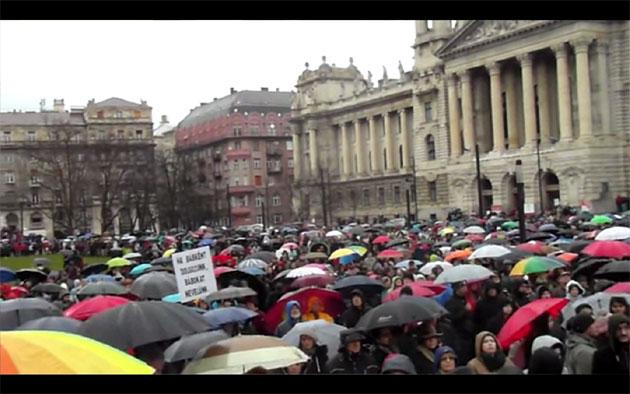Hungarian teachers take to the streets seeking integration of Roma and apology from PM

On 15 March, the biggest state holiday in Hungary, tens of thousands of teachers took to the streets in Budapest. They have been expressing their disagreement more and more resolutely with the events of recent months and their growing dissatisfaction with the Hungarian Government’s education policy.
The teachers are seeking an apology from the Government for its allegedly humiliating treatment of schoolmasters and want to begin a debate about meaningful school reform. They are also seeking greater freedom in choosing textbooks, a reduction in the burden placed on students, an initiative to integrate disadvantaged Romani students into the schools, and a curriculum adapted to the "demands of the 21st century".
Should these demands not be met, the teachers have threatened to strike for one hour on 30 March. The main speaker at the protest was István Pukli, the principal of a college preparatory secondary school in Budapest.
Pukli said any future strikes would last for increasingly longer times if "the Government fails to understand that it cannot go against its own country". Speaking in front of the building of the Hungarian Parliament, Pukli said: "Should Prime Minister Viktor Orbán, as a representative of the Government, and President János Áder, as a representative of the state, not apologize to the people by 23 March 2016, to those who have been humiliated and intimidated for the last six years… [then] we will call for an hour-long general strike on 30 March by 70 affiliated organizations, 950 institutions, and 35 000 private individuals, which is to say, 67 % FIDESZ voters and 75 % of society…".
During any eventual strikes, teachers would walk out of their school buildings. Pukli has called on "everyone who cares about their children’s future" to join the protest action.
"Life in Hungary should stop for one hour," the principal said. He also pointed out that currently (since December 2014) Hungarian law states that during a strike it is not possible to stop work without prior approval from the relevant labor commission.
Under the law, any announcement of a strike without taking such measures is considered a demonstration of civil disobedience. "That means one has no choice but to agree with the Government," Pukli interpreted the law as implying.
"If we already agreed with the Government, then what use would a strike be?" the principal asked rhetorically. The demands of the educators are formulated in a 12-point manifesto and Pukli’s demand for an apology was commented on by Orbán on 16 March for the Hungarian daily Népsazabadság.
"I took that for a joke," the Hungarian PM said. "The entire thing sounded quite comical."
"The fact that the Prime Minister considers my words comical confirms my opinion that the Government has no strategy for education, does not know how to respond to the justified demands of educators, and does not have the slightest notion of how to behave in such a situation," Pukli responded. According to the Associated Press, the 15 March event was the biggest anti-government demonstration in Hungary since the protests against a planned Internet use tax in 2014.